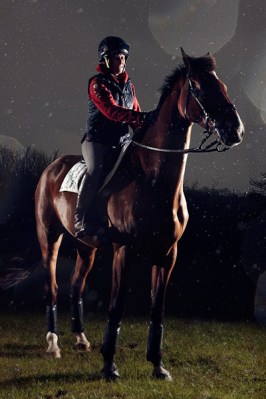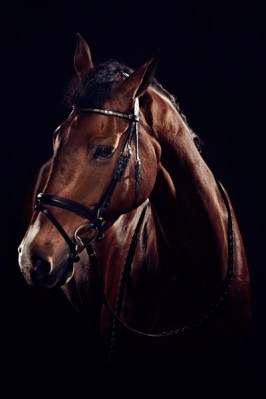
British equestrian Mary King, one of the top-ranked event riders in the world, will make her sixth Olympic appearance for Great Britain in London. Her sport, eventing, includes three disciplines: dressage, show jumping and cross-country. At 51, King is the oldest competitor for Great Britain and one of the most accomplished. In addition to picking up team Olympic silver in 2004 and bronze in 2008, King is a four-time British champion and has won all three competitions in the Grand Slam of eventing, including the Badminton Horse Trials in the U.K. King, who began her career riding the local vicar’s pony at age 6, nabbed the world number one spot in 2011 with the help of her top horse, Imperial Cavalier, known as Archie, whom she will ride at the Olympics this summer. She spoke with TIME at her home and stables near Salcombe Regis, Devon, about horse massages and why eventers don’t ride stallions.
(MORE: Equestrian Eventing: The Olympics’ Most Dangerous Sport?)
TIME: What sort of mental qualities do you look for in an Olympic horse?
King: They’ve got to be very forward-thinking. You get some horses that come out of their stable and they’re on a mission. They’ve got that joy of life about them. It’s those horses that are usually the most successful.
At what point do you realize a horse could reach Olympic level?
Quite early on. It’s how they take to those first few events you take them to. Do they think, “Yippee, it’s this again!”? Or do they go to the next one thinking, “Oh dear, it’s this again”?
Do the horses enjoy it?
The good horses love it! When you take them up to the lorry or dress them up [to go to an event], it’s like they’re off going to a party.
Does it matter if a horse is a male or a female?
No. Geldings [castrated males] are more popular because they have on average a more consistent temperament, whereas a mare might get unsettled at the competitions if there a lot of males around and she’s in season. When I began breeding horses, the first three were all girls, and I thought, “Oh dear.” But in fact, I’ve had great success with them.
What about stallions?
You would have thought that a stallion would be the best event horse, but in fact, often stallions aren’t brave enough, because they’ve got their [genitalia] to worry about. It makes them a little bit more wary.

Levon Biss for TIME
How do you teach them?
It’s constantly repeating — they’re like children, always stretching the boundaries. A good trainer is somebody who’s very methodical, very ready to reward them when they do things well but consistently correct them when they do things wrong.
How do you communicate with them, and who’s in charge of what?
Their sides become a bit like a series of buttons. Depending on where you put your leg,with how much pressure, means different things. You as a rider are totally in charge of the pace, the direction, the steering, and then it’s up to the horse to actually jump the jump.
Would you take them around the course at all before?
No, part of the sport is that the horses don’t get to see the fences. They have no idea what they’re going to be jumping at the competition until they’re galloping fast towards the fence. Whereas the rider will walk the cross-country course before a big event four times at least. You get it really clear in your mind, and then the horse trusts you.
In 2008 your horse Call Again Cavalier, with whom you won an Olympic medal, was put down after breaking a leg in a fall during competition. How did that affect you?
It was awful, hideous. It’s like losing part of your family. He was an older horse, and no point in trying to operate on him and keep him alive, because he was coming to the end of his career anyway. And even if they had managed to pin the break, it would have been ages of him having to keep still which is so unnatural for a horse. It was horrible, saying goodbye to him. I didn’t see them shoot him, because I couldn’t bear to watch that.
Are you ever afraid before an event?
If you were frightened, you wouldn’t do it. It’s more the worry about doing something ridiculously wrong as a rider. That’s what you’re worried about — letting people down, letting your horse down.

Levon Biss for TIME
How often do your Olympic horses train?
Six days a week. Every third day they do their galloping, their aerobic work. They have one day off a week where they spend a half day out in the field relaxing.
What do you feed the horses? Is there a horse equivalent of Gatorade?
They have three feeds a day. It’s a horse mix like muesli — a mixture of grains, oats, barley and maize. It has a bit of molasses in it, so it’s slightly sweet, which they really enjoy. The horses have electrolytes, especially when they’re traveling. Hydration, as with human athletes, is seriously important to their performance.
Do they get massages?
Some riders are very into that sort of thing. I’m a bit old-fashioned. I’m more of a physiotherapist on top.
Do you think the horses should get medals?
They get lots of pats and cuddles, and they know when they’ve done well.
Do they get a special treat if they win gold?
Time in the field. Lots of green grass.

